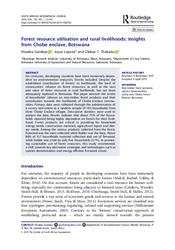Forest resource utilisation and rural livelihoods : insights from Chobe enclave, Botswana.
Date
2020-01-31Author
Thakadu, Olekae T.
Garekae, Hesekia
Lepetu, Joyce
Metadata
Show full item recordAbstract
For centuries, developing countries have been immensely dependent on environmental resources, forests included. Despite the established contribution of forests to livelihoods, the level of communities’ reliance on forest resources, as well as the uses and value of these resources in rural livelihoods, has not been adequately explored in Botswana. This paper assesses the extent of households ’reliance on non-timber forest products and their contribution towards the livelihoods of Chobe Enclave communities. Primary data were collected through the administration of a survey instrument to a random sample of 183 households from three Chobe Enclave villages. Descriptive statistics were used to analyse the data. Results indicate that about 75% of the house-holds reported being highly dependent on forests for their livelihood. Forest products are critical in providing for household energy needs, construction materials, agricultural inputs and dietary needs. Among the various products collected from the forest,firewood was the most collected while fodder was the least. About86% of 157 households reported collection and use of fire wood,while fodder was cited by only five households (2.7%). In promoting sustainable use of forest resources, this study recommends a shift towards key alternative strategies and technologies such as species domestication and energy efficient firewood stoves.
Collections
- Research articles [88]

